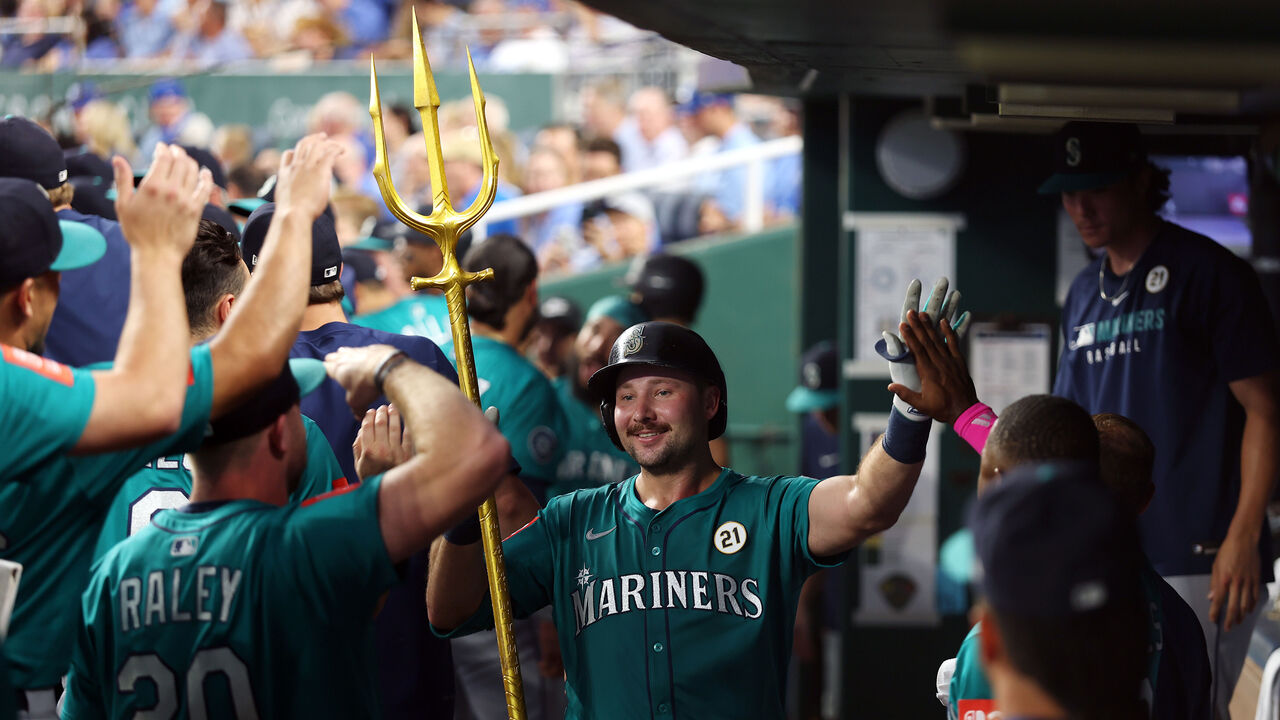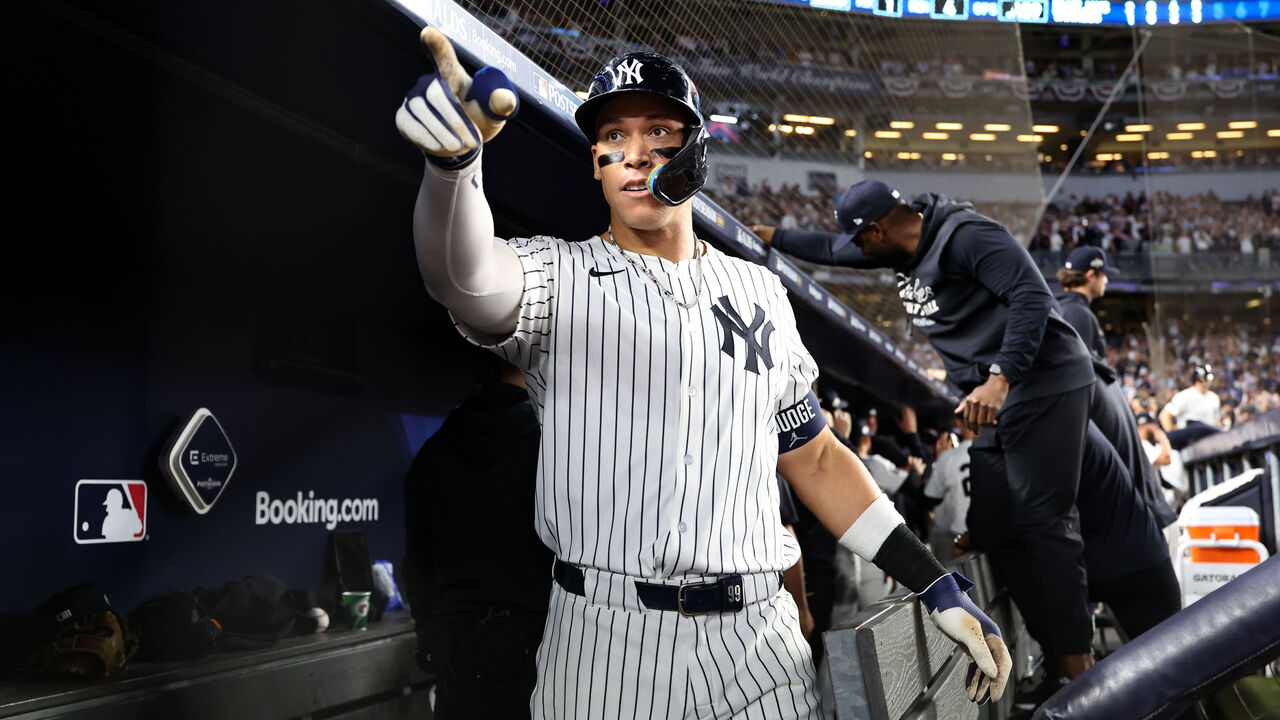Judge vs. Raleigh: Who should win AL MVP?
Aaron Judge and Cal Raleigh put together two historic seasons, but only one player will be rewarded for his efforts Thursday (7 p.m. ET) when the BBWAA announces the winner of the American League MVP. Will Raleigh become the first Seattle Mariner since Ichiro Suzuki in 2001 to take home the award, or will Judge join exclusive company as the eighth player in MLB history to win at least three MVP titles? Our MLB editors Simon Sharkey-Gotlieb and Brandon Wile make their case for who should win in 2025:
Why Raleigh should win MVP?

Let's get this out of the way: supporting Raleigh for AL MVP is not a knock against Judge, nor is it a sign of voter fatigue. Judge may be the greatest right-handed hitter we'll ever see, and he produced another tremendous season. It's just bad luck for him that Raleigh had the year he did at the same time.
First, we'll go to the basis of Raleigh's MVP case. He hit 60 home runs in 2025, marking the 10th 60-homer season in MLB history and the fourth accomplished outside the "steroid era" between 1998 and 2001. The 28-year-old also set a single-season home-run record for switch-hitters, beating Mickey Mantle's 54 long balls in 1961. Plus, Raleigh led the AL in RBIs with 125.
On its own, that's a remarkable and award-worthy feat. And then you realize that Raleigh hit 60 homers as an everyday catcher.
Catchers aren't supposed to do all that. The best offensive backstops in history never came close to this kind of power number due to the demands and physical toll the position takes on the body. Yet Raleigh shattered expectations, not only breaking the single-season home-run mark by a primary catcher by being the first ever to hit 50 - let alone 60 - but he also became the first backstop to record at least 80 extra-base hits. All the while, he shepherded the Mariners' top-tier pitching staff every day and didn't allow a passed ball in 1,072 innings behind the plate. That's jaw-dropping stuff.
Now, we must acknowledge here that Raleigh started 38 games at DH to get him some rest and keep his bat in the lineup. But if you look at his splits, you'll see that he hit better on days he was catching. That should weigh heavily in his favor.
Raleigh's 49 homers while playing catcher were seven more than the previous record. But we can dig even deeper. Before this year, only two primary catchers hit 45-plus homers in a season: Johnny Bench recorded 45 in 1970, and Salvador Perez had 48 in 2021. Let's put their positional homer splits alongside Raleigh's 2025 splits. Just for fun, we also added Bench's 40-homer 1972 season to the table.
Raleigh's clearly not the only power-hitting catcher who's added to his home-run totals at other positions. And in case you're wondering, Bench won NL MVP in 1970 and '72, with no controversy over him playing different positions. Had there been a DH back then, there's no doubt that Bench would've used the spot to get rest and pad his totals.
Another point that critics of Raleigh pick at is his .247 batting average, which would be the lowest ever for an MVP hitter. However, the number hardly disqualifies him. Seven players have gone on to win MVP despite hitting below .275 during the season, and several of those years are now considered historic. Shohei Ohtani's .257 average in 2021 is the lowest for an MVP-winning hitter, and voters rightly ignored that stat because of his unprecedented two-way performance.
But take a look at some of the other campaigns on this list. Bench hit .270 with 40 homers during his 1972 MVP season behind the plate. Yogi Berra won in 1955 while hitting .272 as a catcher, during an era when batting average was a far more meaningful statistic. And then there's 1961 AL MVP Roger Maris, who bested teammate Mickey Mantle despite hitting just .269. Maris' 61 homers and AL-best 141 RBIs were enough to beat out Mantle's superior stats in other categories. Sound familiar?
Again, none of this should downplay Judge's 2025. However, he didn't deliver a true season for the ages while catching every day and guiding one of baseball's best pitching staffs to excellence. Raleigh accomplished something truly unique, and there's enough precedent to justify him winning MVP. - Sharkey-Gotlieb
Why Aaron Judge should win MVP?

There's no disputing that Raleigh had the best season ever for a catcher, but it wasn't better than Judge's campaign. This award is about determining the most valuable player overall, rather than the best at an individual position.
The Yankees outfielder led MLB in average, on-base percentage, slugging, OPS, and fWAR. He's only the sixth player to top MLB in all triple slash categories since 1943.
Judge won the batting crown by .020, led the league in OBP by .058 and slugging by .066, and recorded an OPS .131 higher than Ohtani, who finished second. Judge didn't just lead every category; he crushed every great hitter this season. That's almost hard to comprehend.
If we compare Judge to Raleigh offensively, the two players aren't even close. Raleigh outhomered Judge by seven, but the Yankees slugger still finished fourth in the majors with 53 home runs - a mark that's only been reached 36 times in MLB history. Judge also received 55 fewer at-bats than Raleigh, in part because he drew 124 walks, including an MLB-leading 36 intentional walks, compared to Raleigh's 17. The opposing managers told you who the more imposing hitter was.
Judge finished with an OPS that was .197 points better than Raleigh's, and his 204 wRC+ ranked as the ninth-highest mark since 1961. Seven of the eight players who have posted at least a 200 wRC+ won the MVP that season, with the exception being Mark McGwire, who finished second in 1998.
Of course, the MVP isn't the best offensive player award, and defense is where many people lean toward Raleigh. Being a catcher is one of baseball's most underappreciated jobs, and Raleigh deserves enormous credit for the work he's done behind the plate and with the pitching staff. However, that shouldn't discredit the value Judge brought defensively.
An elbow flexor strain limited Judge to 95 games in right field and forced him to only DH for all of August. When he was in the outfield, Judge remained one of the best defensively at his position, ranking in the 86th percentile in outs above average, 85th percentile in arm strength, and 84th percentile in arm value, according to Baseball Savant. He also finished with three defensive runs saved, which isn't an elite number but illustrates that he was a positive presence with the glove.
Additionally, Judge deserves credit for playing through a pretty debilitating elbow injury. He missed only the minimum time on the IL, and even though he returned as the DH for a month, he slashed .305/.473/.634 with 16 home runs in 34 games with a bad elbow. Judge also played 15 of the Yankees' final 22 regular-season contests while injured in the outfield to help get Giancarlo Stanton's bat in the lineup.
When New York struggled in June and July, Judge kept them afloat, slashing .267/.396/.621. Then he posted a 1.546 OPS over the final three weeks of the season as the Yankees tried chasing down the Blue Jays to win the AL East title. Judge had an OPS over 1.000 in four of the six months and didn't see it dip below .923 in the other two. Meanwhile, Raleigh hit .194 in July and .173 in August.
Judge was the best and most consistent player throughout the season. Although Raleigh reached feats that no catcher has ever achieved, Judge accomplished things that few players in the history of the game have ever done, regardless of position. He should wake up Friday morning as a three-time AL MVP. - Wile